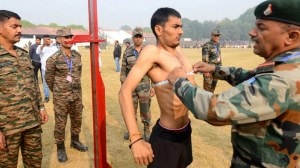Click here to join Express Pune WhatsApp channel and get a curated list of our stories
Time travelling actor in Pune with a story about India’s freedom
On February 9, Pathak will present Mahadevbhai at Shreeram Lagoo Rang-Avakash on Tilak Road. The show is brought by Spotlight Forum.
 Sources in the Techno City police said all four persons were admitted to a nearby private hospital. Two of them are in critical condition.
Sources in the Techno City police said all four persons were admitted to a nearby private hospital. Two of them are in critical condition.When Jaimini Pathak first began to play 35-odd characters all alone on stage for two hours in Mahadevbhai, it was 2002 and he had no way of knowing that the story would become more relevant in the next two decades. “If that’s a good thing or not, I am not too sure because Gandhi spoke about a lot of things that he was hoping Indian society would adopt. He spoke about the removal of untouchability, communal harmony, improved status of women and self-reliance in the economy, among others. He was all for decentralization; going smaller and into villages and strengthening that as a basic unit of the economy. This, as well as the status of women, is becoming more questionable now in the present mahaul,” says Pathak.
On February 9, Pathak will present Mahadevbhai at Shreeram Lagoo Rang-Avakash on Tilak Road. The show is brought by Spotlight Forum. “I believe in keeping on doing what I believe in. The play is a thing and it does its own work,” says Pathak. Mahadevbhai, written by Ramu Ramanathan, is based on the the diaries of Mahadev Desai, Gandhi’s personal secretary, scholar and freedom fighter.
Pathak recounts the time Narayan Desai, the son of Mahadev Desai, had come unannounced to watch the play in Gujarat. After the performance, he told Pathak, “There is no myth in the play and there is no mithya in the play”. “The second thing he said was Mahadev Desai is the tantra to understand the tatva of Gandhi. With reference to the diaries, Mahadev Desai was always present around Gandhi. He would wake up at an hour before the Mahatma and go to sleep an hour after him,” says Pathak. He maintained meticulous notes of every single happening, making him one of the most credible archivist of Gandhi.
Pathak, a Mumbai-based actor on stage and screen, has a distant personal connection to Gandhi similar to that of a protagonist he plays in Mahadevbhai. The story is the present day and is about a young struggling actor who discovers that he’s only six degrees separation from Mahatma Gandhi himself. His grandfather and his granduncle had worked with Gandhi and were friends with Mahadev Desai. Pathak’s own grand uncle was a lawyer like Mahadev Desai and the two practised in Mumbai.
“This was the hook that Ramu took from my life. Then, he wove the story back and forth in time through this link through to Gandhi. If you still go to to the generation that was part of the freedom struggle, they will talk about knowing Gandhi or being in the same movement or city as him at some time. This is not an exaggeration, because there were so many people who were drawn to the freedom struggle,” says Pathak.
The play, thus, draws attention to “the rank and file that one won’t hear of in the history books”. “Mahadev Desai is also rank and file and a symbol for the unknown participants of the freedom struggle that walked with Gandhi but without whom nothing would have happened,” says Pathak.
Click here to join Express Pune WhatsApp channel and get a curated list of our stories








